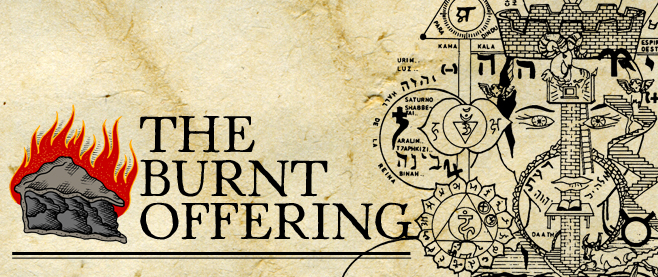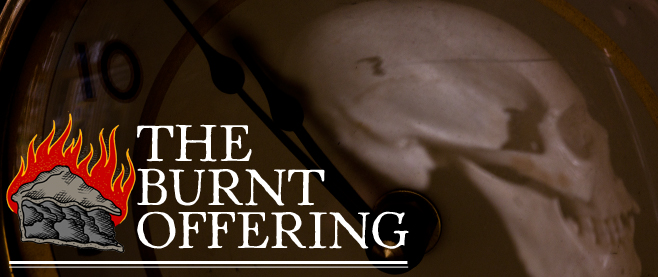
Shelf Space
The Burnt Offering is where Stu Horvath thinks too much in public so he can live a quieter life in private.
———
My house is filled with books.
Nearly every room boasts a bookcase. There is a fire hazard of oversized art and reference books lining the walls of my office. Should a fire actually break out, the first thing I would try to save is my collection of Arkham House books that stands behind a glass door in the living room. At the top of the stairs, by the door to the bathroom, is a small set of shelves filled with choose your own adventures and ’80s movie novelizations.
More books are stuffed into my bedroom – a shelf full of Umberto Eco, two shelves devoted to the occult, two barrister shelves of rare volumes, my collection of Hellboy trades, more Edward Gorey books than you can shake a stick at and more. The room next to my bedroom? That is the library.
All the books that can’t be shoved onto the shelves? They’re in boxes stacked in the attic.

The older I get, the more I am aware of the things I own. Books, board games, videogames, strange old things I have unearthed in antique shops – my possessions form a shell of stratified materialism around my life. My original NES, relics from my father’s machine shop, a set of Dinosaurs Attack! cards, my grandfather’s stamp collection, gifts from old girlfriends – my entire life is all there, a fossil record, if you know how to interpret it.
I recently began to feel the presence of these things too strongly. They’ve become like the opposite of a phantom limb, a haunting extension of myself. I can feel the shell calcifying around me. It’s getting claustrophobic in here. I need some breathing room.
The problem is that so much of this stuff has a value to me – material, sentimental, nostalgic or otherwise. I can’t sell off my grandfather’s stamp collection, no matter how valuable it may be. On the other hand, the custom race car parts salvaged from my father’s machine shop aren’t worth more than the aluminum they were milled from, at least to anyone who isn’t me.
And books, how could I possibly get rid of my books?

Books have a distinctly tactile component that is lacking in other media. We handle them more intimately than, say, records or DVDs. We turn their every page, gazing at every inch of each piece of paper. We feel them and they accompany us, to work and back, to the bathroom, to bed. The physicality becomes entwined, not just with the stories that are printed on them, but the life we are living when we read them.
The Dark Secret of Weatherend, by John Bellairs, is about Anthony Monday and Ms. Eells saving the world from black magic. My dog-eared copy, however, is also a physical artifact of a memory – reading at the table in a restaurant called Tio Pepe in Tampa, with my grandparents, my parents and Aunt Freddie. Tio Pepe and Aunt Freddie are both gone now, but I still have that book.
There are more. A ratty old copy of The Lurking Fear, a Lovecraft collection, has grease smudges from being read one quiet summer day at my father’s garage. My first copy of Dracula, illustrated with soap opera-style paintings by Greg Hildebrandt, was read sitting on the floor of the backseat of my grandparents’ car on a drive through the Pine Barrens – and inspired terrible nightmares. I have trouble looking at A Feast for Crows without recalling the terrible hangover I had during E3 2011.
Those are memories lining my shelves.

Some books are just stacks of paper, though. I don’t have any particular memories that are represented by the almost embarrassingly large pile of trade paperbacks that constitute the key moments of the last 10 years of DC Comics continuity. Even though I bought them last December, the four massive volumes of Absolute Sandman only remind me that Neil Gaiman was best left in the early ’90s where I found him.
Into the stack they go. It is forming in the middle of the library, and grows every time I have a few moments to ponder a shelf. Fourth Edition Dungeons & Dragons rules supplements? My group is going back to Second Edition, throw ‘em on the pile. A novelization of Douglas Adams’ Starship Titanic videogame that isn’t written by Douglas Adams? Gone. All these Hans Holzer books on ghosts? I’ll never read them again.
I’ve emptied two full bookcases so far. It isn’t that these books are bad, it’s that I don’t need them anymore. Someone else should have them to pore over, to make memories with. I will haul them all to the next Geek Flea and find them new homes.
But they can’t stay here. I need the space.
———
Well, maybe the Starship Titanic novel can stay…

Want some of Stu Horvath’s books? Send him a tweet @StuHorvath and see if you make it through the adoption screening process.




